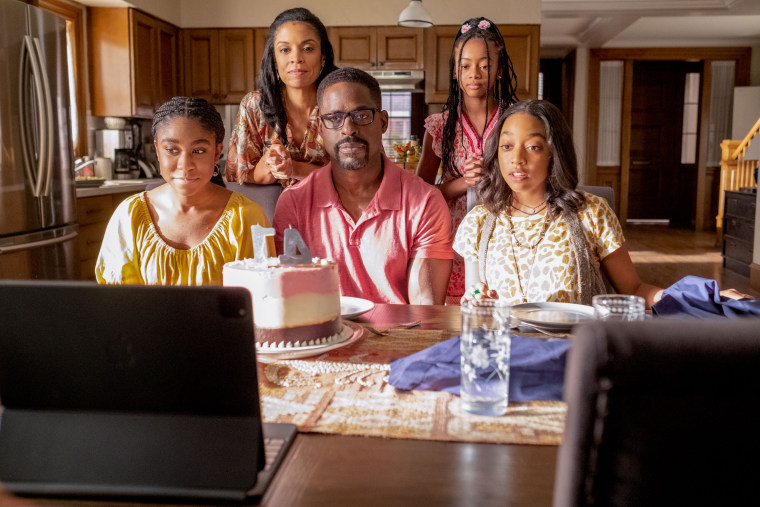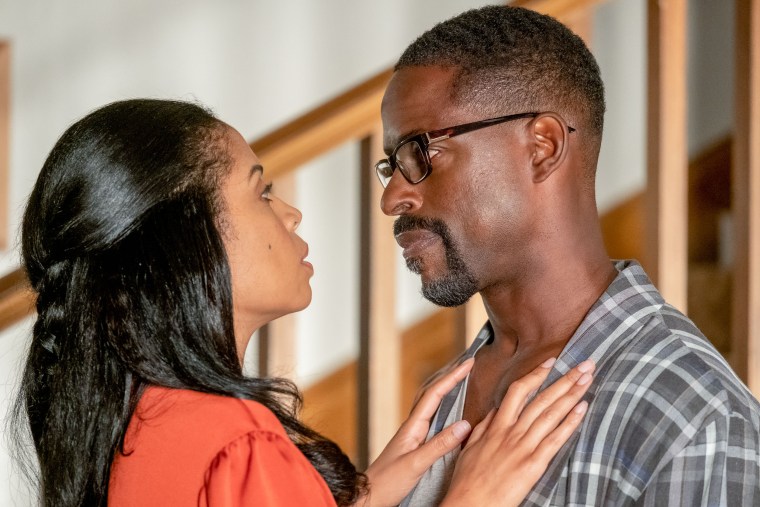In the second season of “This Is Us,” Randall Pearson’s (Sterling K. Brown) story arc sets him on the path of becoming a foster parent to Deja (Lyric Ross), a Black teen caught up in the revolving doors of the foster care system. In the seventh episode of that season, titled “The Most Disappointed Man”, the storyline leads Randall to address Deja’s biological mother’s concerns that the teen’s Blackness will be whitewashed.
“You got a white wife?” Shauna asks Randall after he expresses his desire to place Déjà in a better school.
“Don’t get it twisted, sis,” Randall replies. “I wake up every day to a headscarf and coconut oil. I’m married to a Black queen, not that it’s any of your business.”
Randall’s words proved to be a big moment for viewers who’d become accustomed to watching Black characters whose love interests are primarily white. In expressing admiration for his wife and appreciation for all of the parts that make her Black, Randall displays an act of Black love, a term that many have come to learn about and come to understand through the series’ six-season run.
“Randall and Beth as a Black couple together, they’re always good at communicating well with each other and they’re always supportive with each other’s jobs like when Beth had a dream of opening a dance studio,” Faithe Herman, who began playing Annie Pearson on the series at age 6, added. “They’re just always a great support system to each other.”
Black love exists in a multitude of forms. Above all, it is the simultaneous act of loving a Black person and understanding how race affects their daily existence and their relationship with you.
“I first got introduced to Black love through my mom and my dad,” Niles Fitch (who played teenage Randall) told TODAY, adding that starring in the series allowed him to expand his understanding of what Black love means. “It made me understand how cool being Black is and how (important) surrounding yourself with Black people is because it’s something that can be easily forgotten.”
Throughout its run, “This Is Us” challenged its main characters to learn about the concept. At various points, each member of the Pearson family is put on the path of understanding the responsibility they have to the Black people in their lives, and the show does so primarily through the different storylines around Randall and the members of his own family. Jack, Rebecca, Kate and Kevin are each made to reflect on this throughout the series, whether it is in the confrontations with their adopted Black family member, Randall, or his children.

Jack is called upon to do so when he realizes that his son will need Black male role models in his life and enrolls him in a karate class run by Black men.
Kate and Kevin begin the journey of taking part in Black love soon after the George Floyd protests of 2020. After seasons of tension between the brothers, Kevin and Randall have a long-overdue conversation about how race affected the latter in Season Five, Episode 13 of the show, titled "Brother Love."
“You’re my Black, smart, successful brother... I think maybe I did resent that. I thought you getting special treatment was mixed up with you being Black.” Kevin finally admits to Randall in the episode. “And I wanted to take you down a notch.”
It's a fraught admission but one that puts Randall on the path of healing with regard to how his white brother often contributed to his sense of an othered identity, even in their family household. By shedding his ego, admitting a hard truth, and finally acknowledging his failures, Kevin begins to undo the knots and tangles of his actions for his brother. For the first time, Kevin puts in the work that is required to be in an equally balanced relationship with Randall.
Kate and Randall's relationship dynamic is less toxic and animus than the one between Randall and Kevin, but a teary-eyed conversation between them also sparks an important change. In Episode Two of the fifth season, Kate is seen consistently "checking in" with her brother regarding events related to the Black Lives Matter protests of 2020 and attempts to apologize for what she thinks he must be feeling.
"Specifically, what are you apologizing for?" Randall finally asks. "You've never apologized before."
"I don't know, this feels different," Kate replies.
Of course, as Randall points out, nothing about George Floyd's death or the protests and riots that came after was different. Kate was just guilty of not paying attention to an essential part of her Black brother's experience for four decades. The conversation isn't quite as intense as the ones between Randall and Kevin or even Randall and Jack. Still, in pausing and giving her brother an opportunity to air out his frustrations, Kate does practice the act of love. By putting aside the urge to defend herself, or even receive a pat on her head for being a supportive white person to a Black person, Kate manages to conjure an integral ingredient for Black love and interracial relationships: listening.
By Season Six, Episode 10 of the series, called “Every Version of You,” Rebecca and Randall’s story arc allows them to sew up the wounds made by Rebecca’s shortcomings as a white mother to a Black son. She administers Black love to Randall by realizing her faults by being active in learning more about Blackness. In the episode, she demonstrates this by the simple act of reading. After seeing a profile about Randall in which he shares his favorite book, she also begins to read "Homegoing," a novel with themes about race-related intergenerational trauma.
At the end of the series, all four of these characters practice Black love by recognizing the race-related anxiety, fears, heartbreaks, and joys Randall has endured throughout his life.
“‘This Is Us’ didn’t have to touch on that,” Eris Baker (Tess Pearson) told TODAY regarding how the show worked to address topics such as Black Lives Matter and race. “We could have continued where we were already going, but I’m really happy that Dan (Fogelman) and the rest of the writers wanted to include that.”
Of course, Black love isn’t without its struggles. At various points in “This Is Us,” viewers watched Beth and Randall struggle in their relationship. In Season Three of the series, the question of their capacity to stick things out through thick and thin hangs in the air.
“Black love, it runs so deep. You can say ‘I love you,’ I don’t know how many times and not really mean because your actions are not saying it right … it’s not just a voice thing,” Ross told TODAY.
Ross added that seeing the highs and lows of Beth and Randall’s relationship taught her that love takes work.
“In different relationships, whether it’s with your significant other, whether it’s with your daughter or son, whether it’s with your friends, it still takes work, but even trying — that’s love," she said. "Trying to work things out to communicate, be vulnerable, open up, that’s love. You’re doing this because you love that person. So I think it really comes with the action.”

